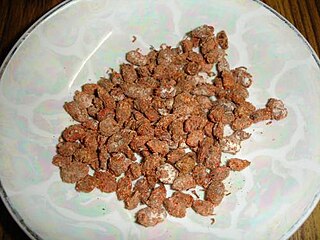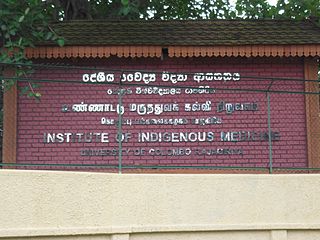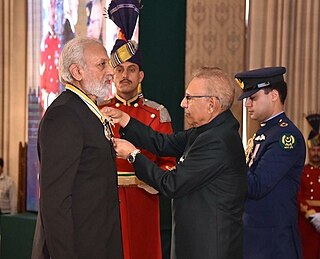Related Research Articles
In the medical profession, a general practitioner (GP) or family physician is a physician who treats acute and chronic illnesses and provides preventive care and health education to patients of all ages. GPs' duties are not confined to specific fields of medicine, and they have particular skills in treating people with multiple health issues. They are trained to treat patients to levels of complexity that vary between countries. The term "primary care physician" is more usually used in the US. In Asian countries like India, this term has been replaced mainly by Medical Officers, Registered Medical Practitioner etc.
Doctor of Medicine is a medical degree, the meaning of which varies between different jurisdictions. In the United States, and some other countries, the M.D. denotes a professional degree. This generally arose because many in 18th-century medical professions trained in Scotland, which used the M.D. degree nomenclature. In England, however, Bachelor of Medicine, Bachelor of Surgery (M.B.B.S.) was used and eventually in the 19th century became the standard in Scotland too. Thus, in the United Kingdom, Ireland and other countries, the M.D. is a research doctorate, honorary doctorate or applied clinical degree restricted to those who already hold a professional degree (Bachelor's/Master's/Doctoral) in medicine. In those countries, the equivalent professional degree to the North American, and some others' usage of M.D. is still typically titled Bachelor of Medicine, Bachelor of Surgery.
A medical school is a tertiary educational institution, professional school, or forms a part of such an institution, that teaches medicine, and awards a professional degree for physicians. Such medical degrees include the Bachelor of Medicine, Bachelor of Surgery, Master of Medicine, Doctor of Medicine (MD), or Doctor of Osteopathic Medicine (DO). Many medical schools offer additional degrees, such as a Doctor of Philosophy (PhD), master's degree (MSc) or other post-secondary education.
A Doctor of Pharmacy is a professional doctorate in pharmacy. In some countries, it is a doctoral degree to practice the profession of pharmacy or to become a clinical pharmacist. In many countries, people with their Doctor of Pharmacy are allowed to practice independently and can prescribe drugs directly to patients. A PharmD program has significant experiential and/or clinical education components in introductory and advanced levels for the safe and effective use of drugs. Experiential education prepares graduates to be practice-ready, as they already have spent a significant amount of time training in areas of direct patient care and research.
A Bachelor of Medicine, Bachelor of Surgery is a medical degree granted by medical schools or universities in countries that adhere to the United Kingdom's higher education tradition. Despite the historical distinction in nomenclature, these degrees are typically combined and conferred together. This degree is usually awarded as an undergraduate degree, but it can also be awarded at graduate-level medical institutions. The typical duration for completion is five to six years.

Unani or Yunani medicine is Perso-Arabic traditional medicine as practiced in Muslim culture in South Asia and modern day Central Asia. Unani medicine is pseudoscientific. The Indian Medical Association describes Unani practitioners who claim to practice medicine as quacks.

Medical education in Australia includes the educational activities involved in the initial and ongoing training of Medical Practitioners. In Australia, medical education begins in Medical School; upon graduation it is followed by a period of pre-vocational training including Internship and Residency; thereafter, enrolment into a specialist-vocational training program as a Registrar eventually leads to fellowship qualification and recognition as a fully qualified Specialist Medical Practitioner. Medical education in Australia is facilitated by Medical Schools and the Medical Specialty Colleges, and is regulated by the Australian Medical Council (AMC) and Australian Health Practitioner Regulation Agency (AHPRA) of which includes the Medical Board of Australia where medical practitioners are registered nationally.
A medicalintern is a physician in training who has completed medical school and has a medical degree, but does not yet have a license to practice medicine unsupervised. Medical education generally ends with a period of practical training similar to internship, but the way the overall program of academic and practical medical training is structured differs depending upon the country, as does the terminology used.

Hamdard University is a private research university with campuses in Karachi and Islamabad, Pakistan. It was founded in 1991 by the renowned philanthropist Hakim Said of the Hamdard Foundation. It is one of the first and oldest private institutions of higher education in Pakistan, and also is the largest private research university in Karachi, with an campus area of over 350 acres.

Hakim Syed Zillur Rahman is an Indian scholar of Unani medicine. He founded Ibn Sina Academy of Medieval Medicine and Sciences in 2000. He had earlier served as Professor and chairman, Department of Ilmul Advia at the Ajmal Khan Tibbiya College, Aligarh Muslim University, Aligarh, for over 40 years before retiring as Dean Faculty of Unani Medicine. Presently, he is serving AMU as "Honorary Treasurer". In 2006, the Government of India awarded him the Padma Shri for his contribution to Unani Medicine.

Hakim Habibur Rahman was an Unani physician, litterateur, journalist, politician and chronicler in early 20th-century Dhaka.
Bachelor of Ayurvedic Medicine and Surgery (B.A.M.S.) is a professional degree focused on Ayurveda offered in India, Nepal, Bangladesh, and Sri Lanka.
The Ayurvedic and Unani Tibbia College, also popularly known as Tibbia College, is an institution under the Government of Delhi, located at Karol Bagh in New Delhi, India. The institution which offers education and training in Ayurvedic and Unani medicine, has its origins dating back to the late 19th century. The college, whose foundation was laid by Charles Hardinge, 1st Baron Hardinge of Penshurst on 29 March 1916, the then Viceroy of India and was inaugurated by the Father of the Nation, Mahatma Gandhi, on 13 February 1921, offers bachelor's and masters (MD) degrees in Ayurvedic and Unani streams.
A clinical officer (CO) is a gazetted officer who is qualified and licensed to practice medicine.

Physical therapy education varies greatly from country to country. Worldwide, physical therapy training ranges from basic work site education in hospitals and outpatient clinics to professional doctoral degree and masters programs.

The Faculty of Indigenous Medicine of the University of Colombo, specialising in Ayurveda and the Sri Lankan traditional medicine. Founded as the College of Indigenous Medicine in 1929, it became part of the University of Colombo adopting its current name in 1977. It is a premier center of undergraduate and postgraduate study and research into Ayurveda and Indigenous Medicine and Healthcare.
The National Council for Homeopathy (NCH) is an autonomous body constituted to regulate the education and registration of homeopathic medical practitioners in Pakistan.

Hakim Syed Khaleefathullah is an Indian physician and the founder of Niamath Science Academy, known for his scholarship and expertise in the alternative medicine system of Unani. He was honoured by the Government of India, in 2014, with the Padma Shri, the fourth highest Indian civilian award, for his contribution to the field of medicine.

Hakeem Rizwan Hafeez Malik is a Pakistani medical researcher, former President of National Council for Tibb and former Administrator/Authority of National Council for Tibb, Ministry of Health Government of Pakistan.

The standard entry-to-practice degree in modern evidence-based medicine in India is the Bachelor of Medicine and Bachelor of Surgery (MBBS). Alternative systems of Medicine in India are Ayurveda (BAMS), Unani (BUMS), Siddha(BSMS), Homeopathy (BHMS). M.B.B.S. a credential earned upon completion of a five-and-a-half-year undergraduate program. The curriculum is divided into one year of preclinical studies in general science subjects and three and a half years of paraclinical and clinical studies, followed by a one-year clinical internship. Before beginning the internship, students are required to pass several examinations, the final one of which is conducted in two parts. Postgraduate education in medical specialties typically takes 3 additional years of study after the MBBS and concludes with the award of a Master of Surgery or Doctor of Medicine(MD). Postgraduate diplomas in medical specialities may also be awarded upon the completion of two-year training programs. After that a person can further get a degree in superspeciality in his or her respective branch after successful completion of 3 years of superspeciality in a medical college.
References
- ↑ Division, Publications (2018-02-26). India 2018: A Reference Annual. ISBN 9788123027630.
- 1 2 3 "Herbal medicine: Woes of practitioners". 2011-06-04.
- ↑ Hoiberg, Dale (2000). Students' Britannica India: Careers. ISBN 9780852297612.
- ↑ Bangladesh Country Study Guide Volume 1 Strategic Information and Developments. 2012-03-03. ISBN 9781438773896.
- ↑ Leigh, Hoyle (2019). Global Psychosomatic Medicine and Consultation-Liaison Psychiatry: Theory, Research, Education, and Practice. ISBN 9783030125844.
- ↑ "Registered Unani Tibb Practitioner". pbdesig.saqa.org.za.
- ↑ "Unani-Tibb". www.uwc.ac.za. Archived from the original on 2018-05-02. Retrieved 2019-09-15.
- ↑ Kurz, Susanne; Preckel, Claudia; Reichmuth, Stefan (2016). Muslim Bodies. ISBN 9783643128102.
- ↑ "پاکستان میں ایسٹرن میڈیسن کا فروغ وقت کی اہم ضرورت" [Promotion of Eastern Medicine in Pakistan is the need of time]. Daily Jang (in Urdu). 2018-05-06.
- ↑ NCT judgement, "15th Meet of the NCT", Date: 19 Jun 2020, REF: F.20-62/2018-NCT(M-15)/4009, page: 02